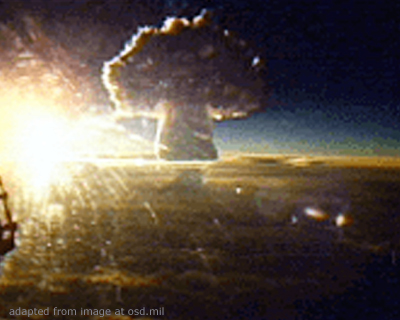Head Of Nuclear Test Ban Treaty Organization Concerned Over Russia's Moves To 'De-Ratify' Pact
The head of the Comprehensive Nuclear-Test-Ban-Treaty Organization (CTBTO) on October 9 expressed concern over the latest moves by Russian lawmakers on revoking Moscow's ratification of the treaty.
"I am concerned that the Russian Federation is taking steps towards revoking its ratification of the Comprehensive Nuclear-Test-Ban Treaty (CTBT)," Robert Floyd said in a statement.
Floyd said he has been in contact with senior Russian officials to make the case that "ratifying the CTBT remains both in Russia's national interest, as well as in the interest of all humanity."
Lawmakers in the Russian State Duma earlier on October 9 asked the Duma's Committee for International Issues and the Foreign Ministry to set a schedule for debates by October 18 on the revocation of Russia’s ratification of the CTBT.
The State Duma Council announced its decision after its members convened to discuss the issue amid heightened concerns over the possibility that Moscow may resume nuclear tests while waging war against Ukraine.
State Duma Speaker Vyacheslav Volodin initiated the council's discussions after last week saying that the Russian parliament's lower chamber at its next session would discuss revoking Moscow's ratification of the 1996 treaty and after Russia's envoy to the CTBTO, Mikhail Ulyanov, said Moscow would revoke it.
"The aim is to be on equal footing with the #US who signed the Treaty, but didn't ratify it," Ulyanov said on X, the social media platform formerly known as Twitter.
The U.S. State Department responded on October 6, saying de-ratification of the treaty "by any State Party needlessly endangers the global norm against nuclear explosive testing."
Russia should reach an "equal footing" with the United States "by not wielding arms control and irresponsible nuclear rhetoric in a failing attempt to coerce other states," the State Department's spokesman said.
Russian Ambassador to Washington Anatoly Antonov reacted to the U.S. Department’s statement, saying on October 9 that “Washington's inaction forces us to reinstate the balance within CTBT. Disruption of the global strategic parity is unacceptable.”
The CTBT has been signed by 187 countries and ratified by 178 but cannot go into force until eight holdouts -- China, Egypt, Iran, Israel, North Korea, India, Pakistan, and the United States -- have signed and ratified it.
Though the United States has not ratified the treaty, it has observed a moratorium on nuclear weapon test explosions since 1992 and says it has no plans to abandon the treaty.
Since the beginning of Russia's large-scale invasion of Ukraine, various pro-Kremlin politicians and public figures, including government officials, have spoken about the possibility of Russia using nuclear weapons or at least resuming nuclear testing.
Kremlin spokesman Dmitry Peskov said last week that the possible de-ratification of the treaty did not mean that Russia would resume nuclear tests.
[please be sure to consider clicking the support button, to support this web project and related efforts]
Key Words: Russia, Nuclear, Nuclear Testing, Arctic
